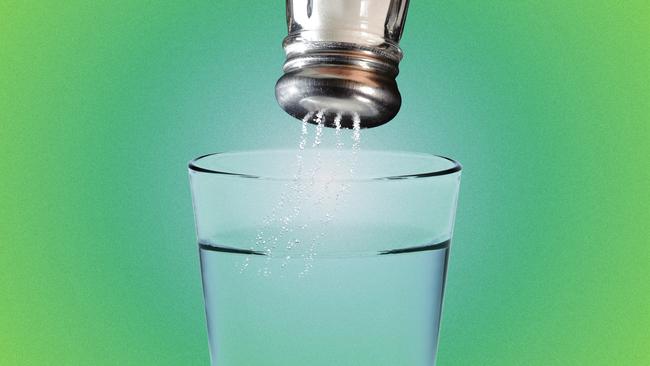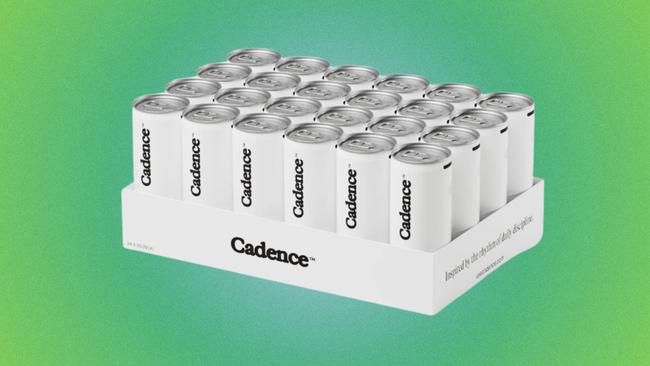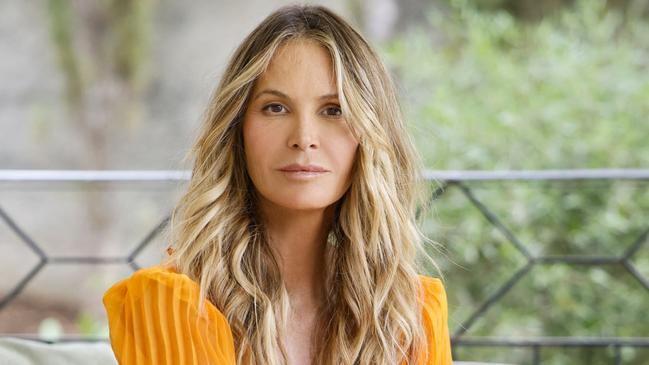The latest health kick is drinking salt water — but should you do it?
It’s trending on TikTok, but is there any scientific support for the daily morning ritual?

The consumer group Which? is publishing a new study tomorrow (Wednesday) concerning trends gaining traction on social media that promote products that are largely a waste of money, including vitamin shots and detox teas. It doesn’t, however, look into the efficacy of the latest liquid health kick that’s trending on TikTok: sipping salty water each morning on an empty stomach (no retching please).
As unappetising as it sounds, proponents of adding a tiny pinch (one 16th of a teaspoon is said to be enough) of salt to a glass of water and drinking it first thing in place of your morning coffee claim that it is not only a route to optimal hydration but a means to supreme inner cleansing, improved digestion and better mental clarity. Which may explain why health-focused posts featuring tips on adding salt to drinks have attracted millions of views on TikTok. Salty water has also been billed as a potential “answer to uncomfortable bloating and water retention” by Glamour magazine, while British Vogue recently revealed that the supermodel Elle Macpherson leaves a glass of water laced with a pinch of pink Himalayan salt by her bed so that she can drink it as soon as she wakes.
Unsurprisingly, there has been a 248 per cent increase over the past four months in online searches for “electrolytes’‘. These mineral salts are essential for a body to function healthily, and include among others the sodium and chloride in regular salt. Little wonder products claiming to restore the balance of body salts are flying off shelves.

A month’s supply of Ancient and Brave’s True Hydration powder, a cocktail of “natural electrolytes’‘ including magnesium, potassium and chromium and Himalayan salt designed to be mixed with water, costs pounds 32 (ancientandbrave.earth).
Cellular Hydration, an electrolyte-containing powder from Artah (pounds 32; artah.co), claims to be “great for energy, focus, mood”. This month saw the launch of a “premium’‘ canned salt water drink, Cadence, that contains sodium chloride, potassium and magnesium and costs an eye-watering pounds 49.99 for 24 250ml cans (usecadence.com). According to the manufacturers its long list of benefits include “reducing physical fatigue and boosting energy”.
It’s an unlikely trend but one that presents a concerning conundrum given that we are consistently reminded by health chiefs to cut down on salt while the World Health Organisation warns that too much of it in the diet is associated with high blood pressure, increasing the risk of cardiovascular disease, gastric cancer, osteoporosis and kidney disease.
Some salt is essential for health, though, and it’s estimated that most adults need up to four grams each day to function well. “Sodium chloride is utilised by every cell in the body and it is vital for biological processes such as fluid nerve impulse regulation, as well as for healthy muscles including those in the heart,” says the registered nutritionist Rhiannon Lambert. But with the health risks that come from getting too much, we should be limiting our intake to less than six grams or one daily teaspoon.

According to the National Diet and Nutrition Survey, most of us routinely get too much, with the average adult’s intake at 7.8g each day, significantly above this upper threshold. So, does it seem conceivable that we should be consuming more sodium, even if it is a daily sprinkle dissolved in water?
“For the average person getting more salt in the diet is not something they should be targeting,” says Dr Lewis James, a reader in human nutrition who specialises in hydration research at Loughborough University. “They have more than enough in their diets anyway.” But are there health benefits to sipping salt occasionally? Here we ask the experts:
What are electrolytes and why do we need them?
Electrolytes are “electrically charged’‘ mineral salts that are present in the body’s fluids - the blood and urine, for example - and play an important role in the functioning of nerves, muscles, brain and heart as well as in fluid balance. They include sodium and chloride - the two components of salt - magnesium, potassium, phosphorus and calcium.
“In the body the main electrolytes responsible for hydration-related issues are sodium and chloride, which help to retain water in the blood and all fluid outside of the cells,” James says. “This is why saline, or salt water, is used in IV drips at hospitals for people who are dehydrated.” Potassium is the main electrolyte inside the cells. “Over a long period of time the total amount of potassium and sodium available will regulate the water balance of our body,” James adds. “But potassium has very little effect on hydration.”
Will drinking salt water first thing hydrate you better?
Probably, James says, although that does not mean we should all be doing it. “There is some evidence that if you drink water containing salt in the morning you retain slightly more - 100-200ml - of the fluid in the body,” he says. “But you get the same effect if you drink milk instead of plain water.”
He says the salt water practice is “probably not relevant to the average person going about their daily life” and only if you are an endurance athlete, have a heavy manual job or do a lot of high-intensity gym workouts that make you sweat a lot is salty water likely to be helpful.
“These highly active people have big fluxes in hydration that the average person doesn’t and at certain times of the day consuming salt in drinks might be beneficial,” James says. “In general our bodies are really good at controlling fluid levels and we mostly drink enough to maintain health perfectly well without the need for salt water.”
If you do want to try it, then a small glass in the morning when you wake up dehydrated “is probably the best time’‘. For optimal hydration and digestion, proponents suggest drinking salt water on an empty stomach, but James says he is unaware of any scientific evidence to support this.
How much salt should be added to water?
This is where you need to be savvy. While salt water influencers might encourage sipping it throughout the day in addition to a morning salt shot, if you add too much salt you can quickly exceed healthy intakes before you even consider the salt in food that has been consumed.
If you are tempted to try it, stick to one 16th of a teaspoon - the tip of the spoon - in water. Even one eighth of a teaspoon - a large pinch - could provide 291mg of sodium, and eight glasses of water containing that much salt alone would exceed the maximum healthy intake of 6g, which, incidentally, is an upper limit and not a target. Once a day is enough.
Will salt water help to cleanse your digestive system?
One of the claims of the salt water brigade is that the daily habit relieves bloating and aids digestion. James says not. “Your kidneys and liver do a great job of removing any toxins from your body and flushing them out through urine or processing and eliminating them. Drinking salty water doesn’t make the process more efficient.”
Is pink Himalayan salt the best type to add to water?
Followers of the salt water trend suggest that pink Himalayan salt is the best to be adding to your glass because it contains the highest amounts of electrolytes and is purportedly one of the purest salts around.
“Salt crystals and flakes or coarse ground rock salt are refined less than table salt so can contain marginally more minerals,” Lambert says. “However, there are no health benefits to choosing these luxury salts.”
The British Nutrition Foundation (BNF) says there is no evidence that expensive pink Himalayan, rock or sea salts are any better for us than cheap table salt and that, chemically, all salts are similar, each containing up to 98 per cent sodium chloride. According to the BNF, any extra minerals in fashionable salts “are present in such tiny amounts anyway, they are unlikely to provide any significant health benefits”. If you want to try salt water, save your money and use the cheap stuff.
Is salt water good for sore throats?
Gargling with - but not swallowing - salt water is an at-home remedy that has been used for centuries. The NHS recommends dissolving half a teaspoon of salt in a glass of warm water (which helps the salt to dissolve), gargling the solution for a few minutes before spitting it out to reduce swelling and pain of a sore throat.
There are other potential benefits. A study in the Journal of Indian Society of Pedodontics and Preventative Dentistry showed that a daily salt water rinse helped to reduce plaque, reducing the risk of dental disease when combined with brushing and flossing.
Where else can we get electrolytes?
Eat a varied diet and you will get plenty of mineral salts from food. Bananas, beet greens, salmon, avocados and potatoes all contain potassium, while spinach, pumpkin seeds, brown rice and almonds provide magnesium. Sodium is not difficult to obtain in the diet but pickles and cheese are among the healthier foods to contain it. Milk is a particularly good electrolyte source and perfect for a recovery drink after exercise.
“Milk contains potassium, protein and about the same amount of salt as a sports drink,” James says. “It also contains carbohydrate in the form of lactose or milk sugars and we have shown all of these combined to be particularly powerful for hydration.”
If you don’t eat dairy, then soya milk is an option. “Soya milk has a hydration effect comparable to cow’s milk,” James says. “It contains slightly less salt, but more potassium to replace sweat losses and a reasonable amount of protein that seems to help hydration in the same way.”
Why do we need to replace salts if we do a lot of exercise?
When we sweat the main minerals we lose are sodium and chloride. “People can lose 1-3g of salt per litre of sweat,” James says. “And very heavy sweaters can lose up to as much as 3-4 litres of sweat an hour.”
Marathon runners, triathletes and participants in hardcore fitness competitions such as CrossFit and Hyrox will therefore benefit from consuming salt-enhanced fluids before, during and after exercise. “With big sweat losses there’s a higher risk of dehydration in these sorts of high-intensity activities lasting longer than about 90 minutes,” says the registered nutritionist Anita Bean, author of The Complete Guide to Sports Nutrition (Bloomsbury).
“Sodium is added to many commercial sports drinks because studies have shown it increases the urge to drink and improves palatability as well as promoting fluid retention in the body.” Too much plain water can backfire in endurance events. “It effectively dilutes the sodium in your body, reducing thirst sensations before you are fully hydrated and can ultimately lead to a condition called hyponatraemia, or water toxicity, which is dangerous,” Bean says.
“Adding very small amounts - 0.23-0.69g per litre - of salt when sweat losses are high is beneficial, but if you are exercising for less than 90 minutes, adding sodium won’t help your performance.”
Replacing other electrolytes, such as potassium, during exercise is unnecessary “unless sweat losses are high and prolonged for over two hours”, Bean says. “You will replace all electrolytes by eating and drinking healthily in the hours after exercise.”
The Times





To join the conversation, please log in. Don't have an account? Register
Join the conversation, you are commenting as Logout